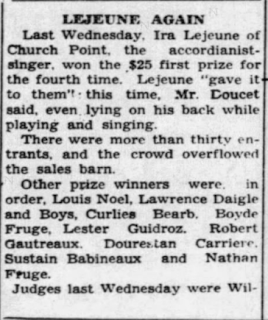Moi et ma belle on a été au bal,C'était un samedi soir,On en a revenu c’était lendemain,Lendemain matin z- au jour,J'ai demandé si elle avait pas faim pour quelqu'chose,Elle m'a répondu (qu') elle avait pas faim,Mais elle aurait mangé quand même.Moi je pensais aller ordonner un lunch de quinze sous,Moi je pensais aller ordonner un lunch de quinze sous,Elle a ordonné un poulet rôti, une demie douzaine de z"huitres,Elle a ordonné un poulet rôti, une demie douzaine de z"huitres.Moi, j"avais faim, mais j'avais pas le cœur de manger,Moi, j"avais faim, mais j'avais pas le cœur de manger,Et quand je pensais que j'avais juste cinquante sous dans ma poche,Et quand je pensais que j'avais juste cinquante sous dans ma poche.Et quand j'ai mis mon cinquante sous dessus le comptoir,Et quand j'ai mis mon cinquante sous dessus le comptoir,Il m'a foutu un coup de poing, il m'a tiré dans la fenêtre,Il m'a foutu un coup de pied, il m'a tiré dans le chemin,Écoutez ici, mes amis, ne vas jamais au restaurant,Il faut jamais que tu vas dans le restaurant de cinquante sous dans ta poche.
 |
| Eddie Shuler's Reveliers KPLC in Lake Charles Eddie Shuler, unknown, possibly Eldrige "Coon" Guidry, Amos Comeaux, Johnny Babb, Jimmy Webster, unknown |
Recorded in mid 1946, "Mes Cinquantes Sous" (#1012) is a unique country-Cajun cover of the song "I Had But Fifty Cents", originally written as a poem in 1881 by Sam Devere and published in 1885. It was later recorded by Riley Puckett in 1925 and the Binkley Brothers Dixie Clodhoppers in 1928. Frankie had originally recorded the tune in 1939 as "Moi Et Ma Belle" with the Alley Boys and by 1946, brought the song to Shuler's group. It has been a well known song for years, even recorded by Ricky Skaggs, Jo-El Sonnier, and Beausoleil.
Me and my wife, we went to the ball,It was a Saturday night,We came back the next day,Next morning, during the day,I asked if she wasn't hungry for something,She told me that she was not hungry,But, she'd eat anyways.I thought I was going to order a fifteen cent lunch,I thought I was going to order a fifteen cent lunch,She ordered a roast chicken, half a dozen oysters,She ordered a roast chicken, half a dozen oysters.I was hungry, but I did not have the heart to eat,I was hungry, but I did not have the heart to eat,And when I realized I had just fifty cents in my pocket,And when I realized I had just fifty cents in my pocket,And when I put my fifty cents on top of the counter,And when I put my fifty cents on top of the counter,He punched me, he threw me into the window,He kicked me, he pulled me into the road,Listen here, my friends, never go to the restaurant,You must never go to the restaurant (with only) fifty cents in your pocket.
During the early 1950s, Louis Spell and his French Serenaders would copy Shuler's recording and record "The Fifty Cent Song" for J.D. Miller in Crowley.
By 1957, the Ethnic Folkways Library recorded the tune with Madame Marion Dugadet from Avery Island entitled "La Chanson De Cinquante Sous".
By 1957, the Ethnic Folkways Library recorded the tune with Madame Marion Dugadet from Avery Island entitled "La Chanson De Cinquante Sous".
- Lyrics by Stephane F
Release Info:
A Mes Cinquantes Sous (My Fifty Cents) | Goldband 1012
A Mes Cinquantes Sous (My Fifty Cents) | Goldband 1012
B Jolie Blonde (Pretty Blonde) | Goldband 1012

























